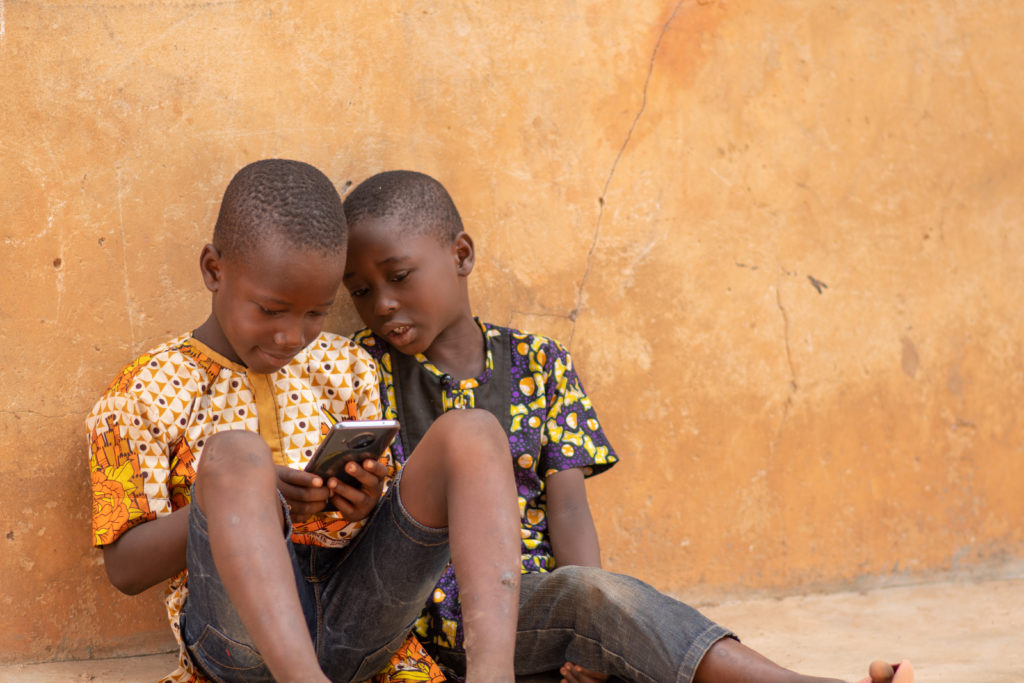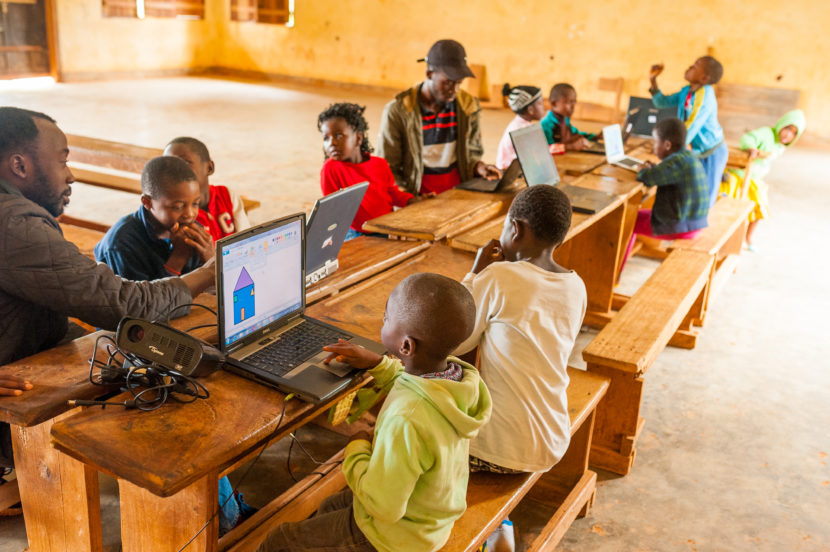Children’s rights in the digital environment go beyond protective rights – rights which protect children from being exploited – to include rights to education, the right to participate and the right to health among many other proactive entitlements. Despite global progress towards the protection of children’s rights in the digital space, the interaction between children and technology in Africa is under-researched. The Day of the African Child celebrated on 16 June 2023 presented relevant actors with an opportunity to address this topic in front of a global audience.
Background on International Day of the African Child
On 16 June 1991, the Organization of African Unity – renamed the African Union in 2002 – introduced the Day of the African Child to commemorate the lives of several children who died during a student-led uprising against the South African Apartheid regime in Soweto, 1976 (African Union, 2023). The day acknowledges the sacrifices made by those children in an attempt to realize their fundamental rights to education and freedom (African Union, 2023).
Beyond its commemorative value, the 16th of June presents an opportunity for relevant stakeholders to come together to discuss and address obstacles and challenges obstructing the realization of children’s rights across the continent (African Union, 2023). To structure this annual event, the African Committee of Experts on the Rights and Welfare of the Child (ACERWC) identifies an annual theme and organizes continental activities to further discuss and promote continental children’s rights.
Day of the African Child 2023: the rights of the child in the digital environment
The Day of the African Child 2023 theme was the rights of the child in the digital environment. As such, African Union Member States and other stakeholders working to protect children’s rights were urged to make concrete commitments toward the realization of children’s rights in the digital space.
The selection of this contemporary theme speaks to the increasing and often pervasive role played by technology in shaping the lives of Africa’s youth population (Association for the Development of Education in Africa, 2023). Research indicates that Africa holds over 40% of the world’s youth population, while over 70% of Sub-Saharan Africa’s population is made up of under-30 youth (Association for the Development of Education in Africa, 2023).
Africa should, therefore, be best placed to capitalize on the incoming digital age and the countless opportunities it presents for young people. Unfortunately, sociopolitical and economic factors continue to plague many of the continent’s nations, preventing children from harnessing the possibilities presented by technological innovation. Over 40% of the continent’s unemployed persons are considered ‘youths’ and, beyond unemployment, huge numbers of young people throughout Africa struggle to access necessities, inhibiting their ability to realize their human rights (Association for the Development of Education in Africa, 2023).
Protecting children’s rights in the digital era on the continent
New technologies belong to the youth. The continued expansion of the digital space, and children’s increasing contact with technology and digital content, has created new children’s rights risks for parents and carers to grapple with. The internet and associated internet usage has seen constant and consistent growth since its inception and popularization in the late twentieth century, particularly amongst young people (Association for the Development of Education in Africa, 2023).
Research conducted in 2022 stated that there are nearly 600 million internet users across the African continent (Association for the Development of Education in Africa, 2023). Globally, children typically account for a third or 30-40% of all internet usage (Association for the Development of Education in Africa, 2023). Though this figure is not based on Africa-specific analysis, it illustrates the increasing role played by technology in child development and growth.

Africa has seen an especially rapid rise in the influx of digital tools: unlike traditional infrastructure such as transport systems and ports, internet access and technology can be embedded into a country’s ecosystem quickly and with little disruption. This creates both risks and opportunities. Younger populations have quickly gained access to a novel set of skills, employment opportunities and learning tools to support their growth. However, without regulation and monitoring, children are also exposed to harmful content, malicious actors and incorrect information, among other dangers.
Long-term dangers impeding digital literacy in Africa
African countries have championed the use of technology as a mechanism to harness the power of their young population. In 2013, Kenya’s former President Uhuru Kenyatta promised free solar-powered laptops for all students across the country to develop widespread digital literacy and increase the country’s technological knowledge base (Mims, 2023). The ACERWC 2021 Agenda for Children identifies technological innovation as a key pillar underpinning the rights of children across the continent, including those with disabilities (African Committee of Experts on the Rights and Welfare of the Child, 2021).
However, lofty ambitions necessitate reliable regulatory frameworks, monitoring and evaluation to guarantee their success. Recent evaluation reports assessing Kenya’s laptop campaign and broader 200 million Euro Digital Literacy Program (DLP) have revealed thousands of stolen, unused, unreliable and wasted sets of technological equipment within the country and across neighboring borders (Muchunguh & Nyamai, 2022).
In Uganda, household surveys by the country’s gender ministry have identified widespread perpetrators of online sexual exploitation taking advantage of children on social media platforms (Owente, 2023). 40% of 12–17-year-old youths in the East African country access the internet routinely (Owente, 2023).
Most effective ways forward
As Africa works to prioritize technology as a vehicle to fast-track development and empower its youth, it is imperative that the continent continues to center the best interests of the child at the heart of all discussions and agendas related to children in the digital space. New technologies and the digital environments children inhabit must be monitored, regulated and tailored to ensure they are supporting, rather than hindering, child development.
These processes require consistent political will and reliable funding, among other governmental support mechanisms. Without strict adherence to these requirements, countries risk turning empowerment into opportunities for exploitation. While each jurisdiction has its own specific needs, there are general steps which must be taken across the continent to increase digital literacy and support children to reach their full potential:
- Ensure equity and access: increased digital literacy is dependent on reliable and fair access to technological services. This applies to both the services infrastructure– such as the quality and consistency of internet services – as well as those educating children on the use of technological tools such as teachers and parents. Without equitable services there is a risk that digital literacy will be reserved for the most privileged, widening inequality gaps and undermining development.
- National buy-in and support: for digital literacy programs to be successful, they must benefit from consistent high-level governmental support. Digital literacy must be built into national curricula, sustained through reliable funding sources and improved with the support of non-governmental organizations with international expertise.
- Ensure digital literacy is sustainable: children must be provided with opportunities to utilize their technological skills beyond their school and childhood years. Countries must work to incentivize technological advancement by rewarding those skills in higher academia and professional workstreams.
- Continuous monitoring and evaluation of risks: governments must consistently and thoroughly monitor emerging digital risks for children given the speed of technological development and innovation.
At Humanium, we seek to raise awareness on the importance of children’s rights to food, education and protection. Moreover, Humanim has been working on improving the situation of children’s rights in Africa for many years now, specifically in Rwanda on the importance of better protection for children and training professionals supporting children who have experienced psychological trauma.
Join us in making children’s rights to a safe environment and accessible education a reality by sponsoring a child, making a donation or becoming a volunteer!
Written by Vanessa Cezarita Cordeiro
Bibliography:
African Committee of Experts on the Rights and Welfare of the Child. (2021). “Africa’s agenda for children 2040, fostering an Africa fit for children.” Retrieved from African Union, accessed on 23 June 2023.
African Union. (2023, June 14-16). “Theme: the rights of the child in the digital environment.” Continental commemoration of the day of the African child. Retrieved from African Committee of Experts on the Rights and Welfare of the Child, accessed on 21 June 2022.
Association for the Development of Education in Africa. (2023, June 16). “ADEA commemorates the 30th day of the African child: the rights of the child in the digital environment.” Retrieved from Association for the development of education in Africa, accessed on 21 June 2022.
Mims, C. (2013, March 4). “A solar-powered laptop in every pot is a key campaign promise of the man who would be Kenya’s president.” Retrieved from Quartz, accessed on 23 June 2023.
Muchunguh, D., & Nyami, F. (2022, November 17). “Inside Uhuru and Ruto’s Sh32 billion school laptops lie.” Retrieved from The Nation, accessed on 23 June 2023.
Nakashole, N. (2023, June 16). “An African child’s rights in a digital era.” Retrieved from Pin Africa, accessed on 21 June 2022.
Owente, Kellen. (2023, June 16). “How can children be protected from accessing unfit digital content?” Retrieved from New Vision, accessed on 21 June 2023.


